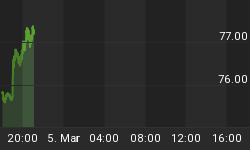Everyone has been guilty, at one time or another, of ignoring a cold. Though you knew you were sick, you may have kept working hard, playing hard, and staying out late. Not until you were bed-ridden did you start drinking orange juice and taking your health seriously. The U.S. economy appears to be following a similar trajectory. We have consistently ignored serious symptoms to the point where our economy is nearly a terminal case.
After ignoring and downplaying the inflating credit bubble for much of his first two years in office, this week Fed Chairman Ben Bernanke emphasized, in testimony before the Senate Banking Committee, that no economic recovery would occur unless the financial system was restored. He was quite correct in his belated diagnosis. His prescriptions, on the other hand, are much more dubious.
As the evidence gathers, it looks as if Bernanke and his new colleagues in the Obama Administration are becoming increasingly desperate. The current recession is deepening at an alarming rate. In fact, it now appears to be diving fast towards the depression that we have long forecast. To prevent necessary deleveraging, the policymakers are improvising on a grand scale.
But, just as happened in the Great Depression, the confusion and experimentation in Washington has sapped businesses of the confidence necessary for a sustainable recovery. Rhetorical posturing by Senators and Cabinet members has replaced earnings reports and economic indicators as market moving events. This is no way for a recovery to begin.
It is widely recognized that the basic cause of today's financial and economic crisis was pressure by politicians to 'encourage' banks to make oversized loans to under-qualified homebuyers. This policy was just one small part of a creeping socialist agenda over the last few decades. Now that the crisis is full-blown, the statist tendencies of the Federal government have come into full flower. As Mr. Obama's chief of staff has noted, the crisis will not go unexploited by those who wish to expand the role of government.
Although the initial reaction to the government bailouts was relief, the financial markets are beginning to question the wisdom of trying to cure a credit problem with the injection of yet more credit. Whether one believes that the 'stimulus' is too much or too little, no one can doubt that the result so far has been failure. And although the spending is small in relation to the problem, it is enormous relative to the national budget.
So, if it doesn't succeed, which I'm sure it won't, the Government will surely feel justified in upping the ante still further. In fact, left-wing think tanks and Nobel Prize-winning economists are currently laying the intellectual track work for such a move. In the end, the American people will be left with severe stagflation.
Though our future looks bleak, I do have reason to hope. Americans are industrious and able to learn from our mistakes. When the depression sets in, economic reality may then deliver the final verdict on socialism and lead to a long overdue restructuring of the American economy. A restored 'producer' economy would return America to the path of prosperity.
In short, after decades of creeping growth, Washington socialism is about to fall flat on its face. I say good riddance to the plague that progressively stifled American enterprise, and has now caused such acute pain to my countrymen.
As perverse as it might sound, this sickness may lead to the cure. Our economy must rid itself of parasitic ideology, broadcast from Washington for as long as anyone can remember. It may take a brush with our economic death-bed to show us the way to a healthier future.
For a more in-depth analysis of our financial problems and the inherent dangers they pose for the U.S. economy and U.S. dollar, read Peter Schiff's just released book "The Little Book of Bull Moves in Bear Markets." Click here to order your copy now.
For a look back at how Peter predicted our current problems read the 2007 bestseller "Crash Proof: How to Profit from the Coming Economic Collapse." Click here to order a copy today.
More importantly, don't wait for reality to set in. Protect your wealth and preserve your purchasing power before it's too late. Discover the best way to buy gold at www.goldyoucanfold.com. Download Euro Pacific's free Special Report, "The Powerful Case for Investing in Foreign Securities" at www.researchreportone.com. Subscribe to our free, on-line investment newsletter, "The Global Investor" at http://www.europac.net/newsletter/newsletter.asp.















